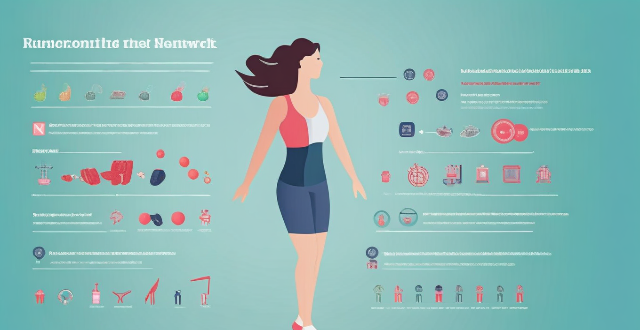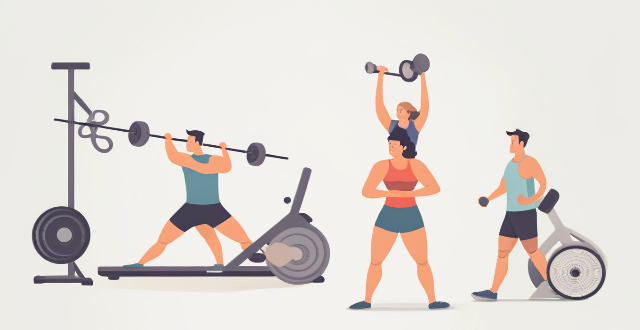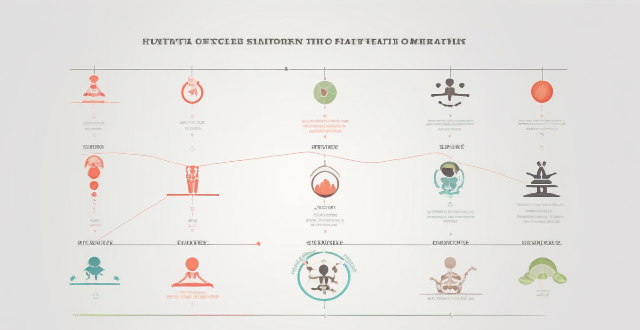Muscle Injury

How can I avoid injury after a high-intensity workout
To avoid injury after a high-intensity workout, it is important to warm up properly, stretch, use proper form, take breaks, stay hydrated, and wear appropriate clothing. These tips will help reduce the risk of injury and allow you to continue enjoying the benefits of high-intensity workouts.

How do I prevent muscle soreness after a long run ?
To prevent muscle soreness after a long run, you should warm up properly, stretch your muscles, drink plenty of water, eat a balanced diet, and rest between workouts. Following these tips can help reduce the risk of injury and improve performance in future runs.

How do I know if I have a sports injury ?
Sports injuries can occur during physical activities or sports, and it is important to recognize the signs and symptoms to ensure proper treatment. Common symptoms include pain, swelling, stiffness, weakness, and instability. There are various types of sports injuries, such as sprains, strains, fractures, contusions, and dislocations. Seeking medical attention for a sports injury is essential to promote healing and prevent further damage. Treatment may include rest, ice, compression, elevation (RICE), physical therapy, medication, or surgery.

How does smart sportswear help in injury prevention ?
Smart sportswear is revolutionizing the way athletes and fitness enthusiasts approach their workouts by providing real-time feedback on their performance and body metrics. This technology not only enhances athletic performance but also plays a crucial role in injury prevention. Below are several ways smart sportswear contributes to reducing the risk of injuries: Monitoring biometric data, providing feedback in real-time, tracking progress over time, enhancing warm-up and cool-down routines, alerting on environmental factors, and promoting consistency and habit formation.

What role does nutrition play in sports injury recovery ?
Nutrition plays a crucial role in sports injury recovery by providing the body with essential nutrients for tissue repair and growth. Protein, vitamins, minerals, and fluids are all important for healing, and proper nutrition can help speed up the process. In addition to nutrition, other factors such as rest, stress management, and physical therapy also play a role in sports injury recovery.

What are the best exercises for recovering from a sports injury ?
Recovering from a sports injury requires a combination of exercises that focus on flexibility, strength, cardiovascular fitness, stretching, and balance/coordination. Range of motion exercises help maintain joint flexibility, while strengthening exercises build muscle strength around the injured area. Cardiovascular exercises improve circulation and promote healing, while stretching exercises reduce stiffness and improve flexibility. Balance and coordination exercises improve stability and prevent future injuries. Incorporating these exercises into your rehabilitation program can speed up recovery and return to sport. It is important to consult with a physical therapist or healthcare professional before starting any new exercise program.

Can physical therapy help with sports injury recovery ?
Physical therapy is beneficial for sports injury recovery, addressPhysical therapy is beneficial for sports injury recovery, address restoration, injury prevention, and addressing pain management, function restoration, injury prevention, and supporting a safe return to activity. It involves assessment, diagnosis, manual therapy, range of motion exercises, strengthening exercises, stretching, balance training, functional training, gradual increase in activity, and education on injury prevention and home exercise programs.

Is it necessary to stretch every muscle group after a workout ?
Stretching after a workout is often considered an essential part of any exercise routine. It helps in improving flexibility, reducing muscle soreness, and preventing injuries. However, the question remains: is it necessary to stretch every muscle group after a workout? Let's delve into this topic and explore the benefits and considerations associated with post-workout stretching.### Importance of Post-Workout Stretching Improved Flexibility Stretching after a workout can help maintain and improve flexibility over time. When muscles are warmed up from the exercise, they become more pliable, making it easier to stretch them. Regular stretching can lead to increased range of motion and better overall flexibility. Reduced Muscle Soreness Stretching can help reduce muscle soreness that may occur after a strenuous workout. By elongating the muscles, stretching promotes blood flow, which aids in the removal of lactic acid and other waste products that contribute to muscle soreness. Injury Prevention Stretching can also play a role in injury prevention. By increasing flexibility and range of motion, stretching can help reduce the risk of strains, sprains, and other injuries that may occur during physical activity.### Considerations for Post-Workout Stretching Not All Muscles Need to Be Stretched While stretching is generally beneficial, it's not necessary to stretch every muscle group after every workout. The focus should be on the muscles that were primarily engaged during the exercise session. For example, if you completed a lower body workout, it would be more beneficial to stretch your legs rather than your arms. Quality Over Quantity It's important to prioritize the quality of your stretches over the quantity. Performing a few well-executed stretches is more effective than rushing through multiple stretches without proper form or technique. Take the time to hold each stretch for at least 15-30 seconds, ensuring that you feel a gentle stretch without any pain or discomfort. Listen to Your Body Your body will provide clues about which muscles need stretching. If you experience tightness or stiffness in a particular muscle group, it's a good idea to focus on stretching those areas. Conversely, if a muscle group feels loose and relaxed, there may be no need to stretch it extensively.### Conclusion In conclusion, while stretching every muscle group after a workout is not strictly necessary, incorporating stretching into your post-workout routine can offer numerous benefits. By focusing on the muscles that were heavily engaged during your exercise session and prioritizing quality over quantity, you can improve flexibility, reduce muscle soreness, and potentially prevent injuries. Remember to listen to your body and adjust your stretching routine accordingly for optimal results.

Can stretching after exercise prevent muscle soreness ?
Stretching after exercise can help reduce muscle soreness and improve flexibility, but it is important to wait for enough time, choose appropriate stretches, be mindful of pain, and use proper technique.

Are there any specific stretches or movements that should be avoided during sports injury recovery ?
During sports injury recovery, it is important to avoid certain stretches and movements that could worsen the injury or delay healing. Stretches to avoid include overstretching, ballistic stretching, and passive stretching. Movements to avoid include high-impact activities, weight-bearing exercises, and sports-specific movements. By following these guidelines and working closely with your healthcare provider, you can safely return to your sport and minimize the risk of reinjury.

How long does it typically take to fully recover from a sports injury ?
Factors influencing recovery time from a sports injury include the type and severity of the injury, treatment and rehabilitation methods, age and overall health of the athlete, nutrition and lifestyle habits, and mental attitude. Immediate care, physical therapy, and medical interventions can impact healing time. Younger athletes generally heal faster than older ones, while proper nutrition, rest, and avoiding risky activities support the recovery process. A positive mindset and addressing mental health issues can also contribute to quicker healing. The recovery time varies significantly based on these factors, and it is essential to consult with healthcare professionals for an accurate estimate and personalized recovery plan.

What is the role of stretching in physical recovery and injury prevention ?
Stretching is an essential component of any physical activity routine, including sports, exercise, and daily activities. It helps to improve flexibility, range of motion, and overall mobility. In this article, we will explore the role of stretching in physical recovery and injury prevention. The benefits of stretching include improved range of motion, improved joint mobility, and improved post-exercise recovery. By increasing flexibility and range of motion, stretching can help reduce the risk of strain injuries such as hamstring pulls or calf strains. Stretching can also help to reduce the risk of overuse injuries, which are common in sports that involve repetitive movements or high levels of exertion. Additionally, stretching can help improve balance and coordination, reducing the risk of falls and other accidents. To stretch properly, it's important to warm up before exercise with some light stretching to prepare your muscles for the workout and reduce the risk of injury. After finishing your exercise, stretch again to speed up recovery time and reduce muscle soreness. You should hold each stretch for at least 30 seconds and go through all major muscle groups. When you stretch, use proper techniques to avoid putting unnecessary stress on your muscles or joints. Stretch slowly and gently, avoiding any sudden or forceful movements.

Can stretching before exercise help prevent sports injuries ?
Stretching before exercise is believed to prevent sports injuries by improving flexibility and range of motion, but its effectiveness is debated due to limited scientific evidence. While some studies suggest stretching may increase injury risk, many experts still recommend it as part of an exercise routine. To stretch safely, warm up first, hold stretches for at least 30 seconds, avoid bouncing, focus on major muscle groups, and listen to your body's signals.

What are some common mistakes people make when trying to recover from a sports injury ?
Recovering from a sports injury is challenging, and common mistakes can hinder progress. These include ignoring professional medical advice, neglecting rehab exercises, disregarding pain signals, poor nutritional support, mental and emotional disregard, improper use of assistive devices, lack of communication with healthcare providers, and unrealistic expectations. Athletes must avoid these pitfalls and work closely with professionals to ensure successful recovery and return to sport stronger than before.

How does sleep deprivation affect muscle recovery after workouts ?
Sleep is crucial for muscle recovery after workouts, as it allows the body to repair and rebuild damaged muscle tissue. Sleep deprivation reduces growth hormone production and protein synthesis, leading to inefficient muscle recovery. Strategies for improving sleep quality include establishing a consistent sleep schedule, creating a relaxing bedtime routine, avoiding screens before bed, getting plenty of exercise, and creating a comfortable sleeping environment. By prioritizing sleep, you can improve muscle recovery and overall health.

Are there any specific training methods that celebrities use for muscle building and fat loss ?
Celebrities use a variety of training methods and nutrition plans to achieve their desired physique, including High-Intensity Interval Training (HIIT), weightlifting, cardiovascular exercise, Pilates and yoga, functional training, and strict nutrition plans. These methods are designed to burn fat, build muscle, improve flexibility and balance, and support overall fitness and mobility. However, individual results may vary depending on various factors.

What role does muscle strength training play in preventing chronic diseases ?
Muscle strength training can help prevent chronic diseases such as heart disease, stroke, type 2 diabetes, and some types of cancer. It also has many benefits for physical and mental health, including improved cardiovascular health, weight management, better bone health, reduced risk of type 2 diabetes, enhanced mental health, increased self-esteem, improved physical function, lowered blood pressure, and cancer prevention. To get started with muscle strength training, it is important to start low and slow, mix up your routine, rest enough, stay hydrated, eat right, and get enough sleep. With dedication and consistency, you can achieve great results!

What is the latest news on LeBron James' injury ?
LeBron James, the Los Angeles Lakers' star player, suffered a high ankle sprain on his right leg during a game against the Atlanta Hawks. The recovery timeline for this injury varies, but he is expected to miss at least a few games as he undergoes treatment and rehabilitation. The Lakers will need to adjust their strategy in his absence and rely on other players to maintain their performance.

How can I prevent further injury while recovering from a sports injury ?
Recovering from a sports injury can be tough, but taking the right steps can prevent further harm. Here's how: 1. **Rest and Ice**: Rest to allow healing; apply ice to reduce swelling and pain. 2. **Compression and Elevation**: Use compression to reduce swelling and elevate the injured area above heart level. 3. **Gradual Return to Activity**: Work with a physical therapist and listen to your body as you gradually regain strength and mobility. 4. **Proper Gear and Technique**: Ensure you have the right gear and use proper form to prevent future injuries. 5. **Stay Hydrated and Nourished**: Drink plenty of water and eat a balanced diet to support your body's healing process.

How do I know if my injury requires a visit to a sports rehabilitation center ?
The article provides a comprehensive guide on how to determine if a sports injury requires a visit to a sports rehabilitation center. Factors such as pain level, swelling and bruising, limited range of motion, and symptoms of instability or weakness are discussed. The article also lists specific symptoms that warrant a visit to a sports rehabilitation center and highlights the benefits of seeking professional help for sports-related injuries. Overall, the article emphasizes the importance of proper assessment and treatment of sports injuries to ensure a successful recovery.

How does AI technology help with injury prevention in sports ?
AI technology is revolutionizing sports injury prevention by providing valuable insights into an athlete's physical condition, performance, and risk factors. Through data analysis, real-time monitoring, biomechanical analysis, recovery support, and injury surveillance, AI technology helps coaches, athletes, and medical professionals take proactive steps to prevent injuries and promote safer sports environments.

How does data analysis contribute to injury prevention in sports ?
Data analysis is a powerful tool for preventing injuries in sports. By identifying risk factors, developing prevention strategies, implementing surveillance systems, evaluating intervention effectiveness, and educating athletes and coaches, data-driven approaches can significantly reduce the likelihood of injuries. This not only protects athletes' health but also improves their performance.

How does sports psychology contribute to injury recovery and rehabilitation ?
Sports psychology can contribute to injury recovery and rehabilitation by helping athletes cope with psychological challenges, develop confidence and self-belief, establish good habits and routines, and adjust to life after injury. Incorporating sports psychology into an athlete's rehabilitation program can lead to better results and quicker recovery.

How can sports medicine help athletes recover from surgery or injury ?
**Sports Medicine: Aiding Athletes in Recovery from Surgery or Injury** The field of sports medicine plays a critical role in helping athletes recover from injuries and surgeries. It involves a multifaceted approach that includes pre-operative management, post-operative care, rehabilitation programs, and facilitating a safe return to sport. Professionals in this area assess the injury, prepare the athlete for surgery, manage pain, provide physical therapy, offer nutritional and psychological support, and create tailored rehabilitation programs focusing on functional training, strength building, flexibility, and endurance. The ultimate goal is to ensure the athlete's complete recovery and prevent future injuries.

Can sports supplements help with muscle recovery after workouts ?
Can Sports Supplements Help with Muscle Recovery After Workouts? Physical exercise and workouts are essential for maintaining a healthy lifestyle, but they can also lead to muscle fatigue and soreness. Many athletes and fitness enthusiasts turn to sports supplements to aid in muscle recovery after workouts. But do these supplements really work? Let's explore the topic in detail. What are Sports Supplements? Sports supplements are dietary products designed to enhance athletic performance, improve physical health, and support recovery from exercise. They come in various forms, including powders, pills, and liquids, and can be consumed before, during, or after workouts. Types of Sports Supplements - Protein Powders: Help in muscle repair and growth. - Creatine: Boosts energy production in muscles. - Branched-Chain Amino Acids (BCAAs): Support muscle building and recovery. - Glutamine: Aids in muscle recovery and immune function. - Omega-3 Fatty Acids: Reduce inflammation and promote heart health. - Multivitamins/Minerals: Support overall health and wellness. How Do Sports Supplements Help with Muscle Recovery? - Protein Powders: Consuming protein powders after a workout can help replenish depleted amino acids, leading to faster recovery times. - Creatine: Increases the availability of phosphocreatine, which helps regenerate ATP more quickly during high-intensity exercises, reducing muscle fatigue and aiding in recovery. - BCAAs: Consuming BCAA supplements before or during workouts can reduce muscle damage and speed up recovery processes. - Glutamine: Supports muscle recovery by helping maintain cellular volume and preventing muscle breakdown. It also supports immune function, which is important for overall health and recovery. - Omega-3 Fatty Acids: Have anti-inflammatory properties that can help reduce muscle soreness and stiffness after workouts. They also support heart health, which is crucial for athletes who engage in cardiovascular exercises. - Multivitamins/Minerals: While not directly related to muscle recovery, consuming multivitamins or minerals can support overall health and wellness, which indirectly aids in recovery processes. Are Sports Supplements Safe? While sports supplements can be beneficial for some individuals, it's important to note that they are not regulated by the Food and Drug Administration (FDA). This means that their safety and effectiveness may vary between brands and products. It's always best to consult with a healthcare professional before starting any supplement regimen. Additionally, relying solely on supplements without proper nutrition and rest can be counterproductive. A balanced diet, adequate sleep, and proper hydration are still key components of effective muscle recovery.

Can dehydration really cause muscle cramps during physical activity ?
Dehydration can lead to muscle cramps during physical activity due to loss of essential electrolytes and reduced oxygen supply to muscles. Signs of dehydration include thirst, dark urine, fatigue, dizziness, dry mouth, headache, and constipation. To prevent dehydration and muscle cramps, stay hydrated, eat a balanced diet rich in electrolytes, stretch before and after exercise, gradually increase intensity, and rest when needed.

How often should I visit a sports rehabilitation center after an injury ?
The frequency of visits to a sports rehabilitation center after an injury depends on factors like the severity of the injury, individual healing capacity, and recommended treatment plan. Major injuries may require daily sessions initially, while minor injuries might need weekly visits. Individual healing rates also play a role, with some needing more time and support. The treatment plan outlines the recommended visit frequency and necessary interventions. Regular progress tracking helps determine if adjustments are needed. It's crucial to work closely with healthcare professionals for an effective rehabilitation process.